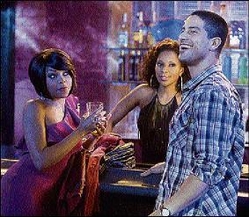MOVIE REVIEW - Perry's new flick builds on tradition
Published: Monday | September 14, 2009
Keiran King, Gleaner Writer

From left: Tajari P. Henson, Mary J. Blige and Adam Rodriguez in a scene from 'I Can Do Bad All By Myself'. - Contributed
Film: I Can Do Bad All By Myself
Writer and Director: Tyler Perry
Starring: Tajari P. Henson, Brian White and Adam Rodriguez
Duration: 113 minutes
Category: Comedy
On September 14, Tyler Perry turned 40 - that age when a man starts to look at his life in both directions: backwards to see what he has accomplished, and forward to see what he still can. Twenty-five years ago, Perry was a high-school dropout living in his car. Now he's one of the wealthiest men in Hollywood, banking US$75 million since last year. And it's all thanks to an old woman named Madea.
Madea is a character Perry developed on the Atlanta urban theatre circuit in the 1990s - played by the man himself under make-up and a body suit - as the embodiment of old-fashioned African American sensibilities. Madea is a militant matriarch, familiar to poor black communities where an inescapable web of dangers makes old men a scarce commodity.
Madea's grandmotherly mish-mash of empathy and empowerment ignited Perry's drag-to-riches rise. He reprised the character in a string of hit plays, which sold well on DVD, and were subsequently adapted into a string of hit movies, the eighth of which, Tyler Perry's I Can Do Bad All By Myself, opened last Friday.
The content of a Tyler Perry movie is simultaneously all-important and inconsequential. I Can Do Bad All By Myself stars Tajari P. Henson as an alcoholic nightclub singer (is there any other kind?) in a relationship with a married man. Her sister's three children, teetering on the edge of delinquency, arrive on her doorstep, newly homeless and parentless. Thus springs forth all the usual Perry themes, designed explicitly for a non-white audience - the strength of the black church, the unity of the black community, the redemptive power of forgiveness, the binding love of family, and so on.
It's enough to make the National Association for the Advancement of Coloured People proud, and make film critics wonder if Walt Disney had an illegitimate son. The two moguls share an abundance of drive and vision. Both men built their own movie studios - Disney in California, Perry in Georgia. Both capitalised on the popularity of a single character - Mickey Mouse and Madea, respectively, and both men, at age 36, catapulted from businessmen to scions based on the success of niche films - Disney with his cel-animated movies for children, starting with Snow White and the Seven Dwarfs (1937), and Perry with his race-conscious pictures, starting with Diary of a Mad Black Woman (2005).
Unique status
But Perry, with his unique status outside the Hollywood mainstream, his prolific pace of production and his ostentatious dress sense, begs another comparison, to an even older man, relegated to history's back pages by his black skin - Oscar Micheaux. In the 1920s, Micheaux, a novelist, saw that black American audiences were underserved. And, like Perry, he saw an opportunity.
Segregation had forced the creation of hundreds of movie theatres exclusively for blacks. Micheaux, with money procured through ingenuity, perseverance and wearing one's best suits, started churning out pictures with subjects that anticipated Tyler Perry's oeuvre by 80 years: Within Our Gates (1920), When Men Betray (1928), Wages of Sin (1929). Michauex gave work to underemployed Hollywood actors and newcomers (like leading man Paul Robeson), a sympathy shared by Perry (I Can Do Bad All By Myself gives major supporting roles to Brian White and Adam Rodriguez).
Micheaux's films are unremembered - perhaps, given their quality, rightly so - but his legacy gave us independent black filmmakers like Melvin van Peebles (in the 1970s), Robert Townsend (1980s), Spike Lee (1990s), and now Tyler Perry. So while Perry's output - like I Can Do Bad All By Myself - may be mediocre, with luck he can look forward to the paradoxical honour of being forgotten, but not forsaken.
reviews@keiranking.com

Tajari P. Henson in a scene from the movie.




















